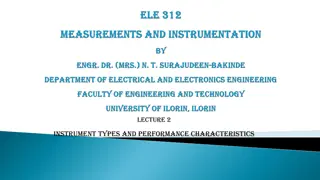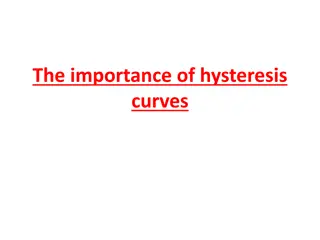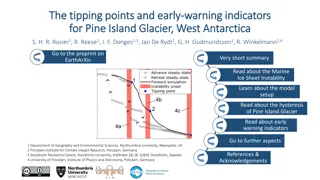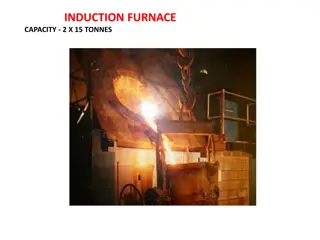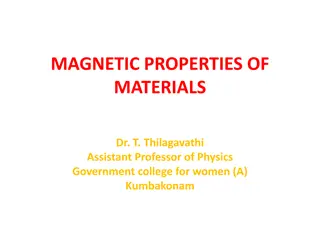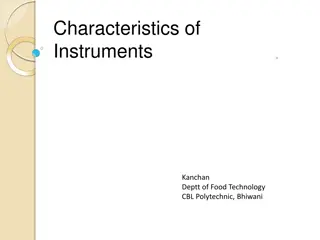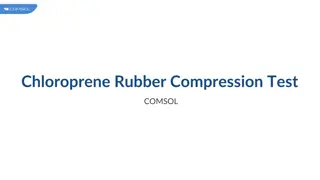Instrument Types and Performance Characteristics
This content discusses different types of instruments, including active and passive, null-type and deflection-type, analog and digital, as well as smart and non-smart instruments. It delves into the static characteristics of instruments such as accuracy, precision, tolerance, linearity, and sensitiv
3 views • 39 slides
Hysteresis Curves and Magnetic Materials in Electromagnetism
Hysteresis curves play a crucial role in understanding the properties of ferromagnetic substances like soft iron and steel. The differences in retentivity, coercive force, permeability, and susceptibility between these materials impact their performance in electromagnets and transformer cores. The c
1 views • 12 slides
Energy Loss Due to Hysteresis in Magnetic Materials
In the realm of magnetism, magnetic materials exhibit unique behavior even when not magnetized. Ewing's theory sheds light on the alignment of molecular magnets in relation to an applied magnetizing field, resulting in energy consumption. This leads to hysteresis loss, where energy is dissipated as
0 views • 8 slides
Early Warning Indicators for Pine Island Glacier in West Antarctica
The study examines the tipping points and early warning indicators for Pine Island Glacier in West Antarctica, a key contributor to sea-level rise. Through an advanced ice flow model, the research reveals three tipping points and their associations with ocean warming. The findings also introduce ear
0 views • 8 slides
SHMS Magnet Studies: Investigation and Challenges
Conducting in-depth studies on the SHMS magnets involving discussions with engineers and analyzing reproducibility requirements for tuning. Focus on Q1 magnet due to its significant field contribution and hysteresis effects. Emphasis on improving accuracy and understanding nonlinearity issues for op
0 views • 9 slides
Induction Furnaces: Efficient Heating for Industrial Purposes
An induction furnace utilizes a combination of electrical resistance and hysteresis losses to efficiently heat metal. By exposing the metal to a magnetic field created by a coil carrying alternating current, these enclosed structures provide a controlled environment for heating materials, gases, or
0 views • 19 slides
Enhancing Emittance Control Strategies in Particle Accelerators
The journey to multi-bunch emittance control goes beyond mere feedback mechanisms, involving nuances like pinhole cameras as detectors and skew quadrupole magnets as actuators. This innovative approach aims to overcome limitations of existing systems like coupling control issues and hysteresis perfo
0 views • 16 slides
Magnetic Properties of Materials in Physics
Explore the magnetic properties of materials through concepts such as basic magnetism, hysteresis, electromagnetic force, permeability, coercive force, and magnetic flux density. Delve into the study of magnetic fields, lines of force, and their applications in various engineering materials and magn
2 views • 17 slides
Analog-to-Digital Converters (ADCs) in Electronics
Explore different types of ADCs such as Flash ADC, SAR ADC, and the Comparator in this informative content. Learn about error sources, bubble correction, and binary search techniques used in ADC design. Gain insights into the importance of hysteresis, resolution support, and linearity in ADC functio
0 views • 13 slides
Characteristics of Instruments in Food Technology
Exploring the static and dynamic characteristics of instruments in the field of Food Technology is crucial for accurate measurements. Static characteristics include stability, range, accuracy, sensitivity, reproducibility, hysteresis, precision, and more. On the other hand, dynamic characteristics f
0 views • 32 slides
Implementing Hysteresis in Comparator Circuits
Comparator circuits with hysteresis play a crucial role in signal processing applications. This article explores the theory behind comparator functions, hysteresis adjustment, and practical implementation using the TLV1701-Q1 series. Learn how to set up non-inverting and inverting comparators with h
0 views • 7 slides
Viscoelasticity in Materials
Viscoelastic materials exhibit properties of both elastic solids and viscous fluids, displaying time-dependent behavior under deformation. This unique behavior impacts various applications, such as device and structure design, emphasizing the importance of comprehending viscoelasticity. Real-life in
0 views • 10 slides
Chloroprene Rubber Compression Test Using COMSOL
Elastomers and biological materials exhibit strain rate dependent mechanical behavior and hysteresis when subjected to cyclical loads. This example demonstrates the use of the Polymer Viscoplasticity feature in the Nonlinear Structural Materials Module for modeling such phenomena using the Bergstrom
0 views • 8 slides
Magnetic Behavior in Two-Dimensional Molecule-Based Magnets
Understanding the magnetic behavior in two-dimensional molecule-based magnets with S=2 spins, exploring MnF3(pyz) with Jahn-Teller elongated Mn(III) octahedra, and discussing the crossover between classical and quantum regimes. The research involves DFT calculations for 1D antiferromagnetic systems,
0 views • 8 slides
